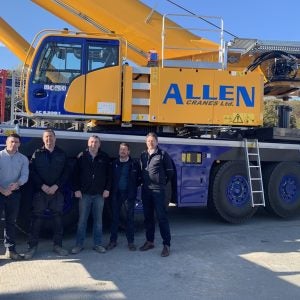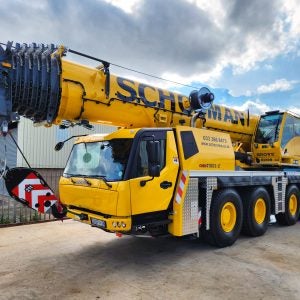Restructuring of the Atlas loader crane and excavator business in Germany and Scotland is running behind schedule, Terex Corporation chairman and CEO Ron DeFeo said when reporting the company’s third quarter results.
Atlas was one of two Terex divisions, along with road construction equipment manufacturer CMI, which made an operating loss in the three months to 30 September 2002.
‘At Atlas, we are a quarter or two behind our operational restructuring goals but remain positive about the contribution potential from this business in 2003,’ DeFeo said.
Net sales in the Terex Cranes group for the third quarter increased $48.5m to $171.5m from $123.0m in the third quarter of 2001. Excluding the impact of the Demag acquisition, net sales for the quarter increased 2%.
Operating profit was $11.8m, compared with $7.3m in the third quarter of 2001.
The backlog of crane orders on 30 September 2002 was worth $186.4m, compared with $44.1m twelve months previously.
By comparison the backlog of Manitowoc Crane Group on 30 September 2002 stood at $139m, of which the Grove division accounted for $72m.
‘The worldwide crane market remains challenging, with softness in many of our end markets,’ said Fil Filipov, president of Terex Cranes. ‘Our mobile telescopic crane and lattice boom crane businesses face difficult market conditions, with double digit revenue declines during the quarter. These decreases have been offset by the acquisition of Demag, continued growth in our boom truck business and continued delivery on our material handler contract with the US Marine Corps.’
Filipov continued: ‘We are aggressively implementing our 100-day plan at Demag. The addition of Demag has not only transformed Terex into a global crane company, but also allows us to do things differently and take advantage of the larger manufacturing scale we now have in the Europe. We have begun to evaluate restructuring opportunities in the third quarter and expect to consolidate manufacturing operations and underutilised facilities and review how we go to market to take full advantage of cost savings and synergies beginning in the fourth quarter.’
Parent company Terex Corporation reported net income for the third quarter of 2002 of $9.8m, compared to a loss of $10.9m for the third quarter of 2001.
Excluding the impact of special items, income for the third quarter of 2002 was $13.9m, compared to $9.0m for the third quarter of 2001.
Net loss for the nine months ended 30 September 2002 was $92.2m, compared to net income of $11.2m for the comparable period in 2001.
Income excluding special items for the nine months ended 30 September 2002 was $41.4m, compared to $35.6m for the nine months ended 30 September 2001.
‘Our third quarter performance reflects the reality that a recovery in the second half of 2002 has not materialised,’ said DeFeo.
‘Our base businesses, excluding special items, although down 13% on the top line, actually improved operating margins to 8.9% compared to 7.4% for the third quarter of 2001, reflecting results of the actions we have taken as a management team to reduce the cost structure of the company. We have also seen our operating margins improve from 8.5% in the second quarter of 2002 despite an 18% reduction in revenues.’
DeFeo continued: ‘At this point in the year we had expected to see some general recovery in the economy. Although I believe we are at the bottom of the trough, there is not enough visibility to predict the timing of any recovery. Given the current economic trends, the sense that consumer confidence remains fragile and the fact that customers continue to delay purchasing decisions, I do not expect any improvement in our end markets in the near term. We anticipate overall performance for the fourth quarter of 2002 to be similar to that of the fourth quarter of 2001. We still remain cautiously optimistic about 2003, as we expect a meaningful benefit from Demag and Genie in the coming year.’






